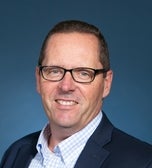Pols: Business Savings, Uncertainty On Horizon
 Matt Pilon
At this morning's Legislative Breakfast, sponsored by the Corridor Nine Chamber of Commerce, U.S. Rep. James McGovern (right) said the fiscal cliff was a manufactured crisis and that Congress should be "engaged in mature discussions about how to get our budget in balance and how to get this economy moving."
Matt Pilon
At this morning's Legislative Breakfast, sponsored by the Corridor Nine Chamber of Commerce, U.S. Rep. James McGovern (right) said the fiscal cliff was a manufactured crisis and that Congress should be "engaged in mature discussions about how to get our budget in balance and how to get this economy moving."
Asked this morning what might happen next month with the Congressional fight to raise the nation's debt ceiling, U.S. Rep. James McGovern admitted the situation is hard to predict.
"The debt ceiling is really to pay your bills," McGovern said. "The United States cannot default on its financial obligations or our credit rating will be decreased again."
McGovern criticized Congress for delaying the debt ceiling decision Jan. 1, when it reached a last-minute deal to avoid a slew of tax increases and spending cuts — a scenario known as the "fiscal cliff" — which had been set to automatically kick in.
"What we did is kick the can down the road for three months," he said.
McGovern made the remarks during a panel discussion in Westborough that included eight state legislators at a breakfast attended by 240 people organized by the Corridor Nine Area Chamber of Commerce.
He said the fiscal cliff was a manufactured crisis and that Congress should be "engaged in mature discussions about how to get our budget in balance and how to get this economy moving."
That can be achieved, he asserted, through a combination of revenue increases and spending cuts, but he said Congress should not forget investments in education and medical research funding.
The panel was asked about a bill filed by Gov. Deval Patrick earlier this month that would repeal a provision of the state's 2006 health care reform law.
The bill would eliminate the law's "fair share" contribution program, which carries a $295-per-employee assessment for employers with 11 to 50 employees who do not provide health insurance for at least 25 percent of those workers.
Sen. Michael O. Moore, D-Millbury, said the bill would eliminate what employers see as an unfair method of calculating the percentage. Under current state law, employers cannot count employees who have insurance under a spouse's plan toward their 25-percent threshold.
"This should be a major cost savings to our small businesses," Moore said.
Panel moderator Mark Donahue, an attorney with Fletcher Tilton, also asked about a transportation bill recently filed by the Patrick administration, which calls for revenue hikes to fund road, bridge and public transportation improvements.
The question sparked a debate between the largely Democratic panel and its two Republican members, Reps. Matthew Beaton of Shrewsbury and George Peterson Jr. of Grafton.
Sen. Harriette Chandler, D-Worcester, called Patrick's plan needs close scrutiny.
"I think we need to weigh what we can afford versus this very ambitious proposal the governor has," Chandler said.
Meanwhile, Sen. James Eldridge, D-Acton, said he feels Patrick's plan recognizes "regional equity" and said infrastructure upgrades are needed to ensure a good quality of life in Central Massachusetts, adding that better roads and bridges also help business.
But Peterson said the state needs to squeeze more savings and revenue out of the Massachusetts Bay Transportation Authority and provide more timely and comfortable trains to taxpayers before funding new projects.
"All I hear from my constituents is the train is never on time, in the summer time there's no air conditioning and in the winter time there's no heat," Peterson said. "This is a service that has been that way for a number of years and there's no excuse for it any longer."
Beaton said infrastructure is important, but noted that Patrick's plan also calls for expansion of rail lines to the Berkshires, Cape Cod and New York City.
"I think its misguided timing to be considering things of that nature when we have such an aging infrastructure," Beaton said. "I think there's an opportunity for us to engage in real reform before engaging in new sources of revenue."













0 Comments